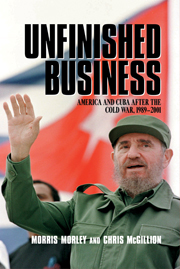Book contents
- Frontmatter
- Contents
- Acknowledgments
- Introduction
- 1 The Bush Administration and Cuba: From Cold War to Deep Freeze
- 2 Clinton and Cuba, January 1993 to February 1996: Closing the Options
- 3 Helms–Burton and the Triumph of Politics over Policy
- 4 Stirring the Waters: Clinton's Missed Opportunities
- Conclusion
- Postscript: Washington's Last Cold War
- Notes
- Index
4 - Stirring the Waters: Clinton's Missed Opportunities
Published online by Cambridge University Press: 28 July 2009
- Frontmatter
- Contents
- Acknowledgments
- Introduction
- 1 The Bush Administration and Cuba: From Cold War to Deep Freeze
- 2 Clinton and Cuba, January 1993 to February 1996: Closing the Options
- 3 Helms–Burton and the Triumph of Politics over Policy
- 4 Stirring the Waters: Clinton's Missed Opportunities
- Conclusion
- Postscript: Washington's Last Cold War
- Notes
- Index
Summary
We have a policy that is not predicated on Cuban actions now.
National Security Council Inter-American Affairs Official, May 1999ONE year into his second term, the gap between Clinton's stated objectives with respect to Cuba and his actual accomplishments seemed as wide as ever. Within the international community, the policy had isolated Washington far more than Havana. Domestically, it had not only failed to make much headway in satisfying the demands of the anti-Castro forces in Miami or on Capitol Hill, but had also generated new sources of opposition critical of the president's failure to show leadership on one of the few remaining unresolved problems from the Cold War era.
In all corners of the globe, America's punitive extraterritorial legislation targeting Cuba provoked dismay and hostility. In regional and global forums, America's allies maintained their anger over the CDA and Helms–Burton, and refused to be diverted from a belief that constructive engagement with the Castro regime was the best way to promote the changes Washington desired in Cuba. The Clinton administration and European governments remained locked in a simmering dispute over Helms–Burton, whose outcome could yet have serious implications for trans-Atlantic relations, the operation of the World Trade Organization (WTO), and the future of global free-trade agreements. In the United Nations, the United States was forced to suffer the annual humiliation of more and more countries voting in favor of a nonbinding resolution calling for a lifting of the Cuba embargo.
- Type
- Chapter
- Information
- Unfinished BusinessAmerica and Cuba after the Cold War, 1989–2001, pp. 131 - 175Publisher: Cambridge University PressPrint publication year: 2002



